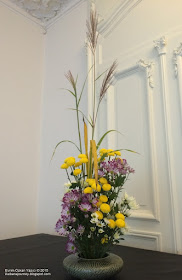To see more of Sogetsu Ikebana floral arrangements for Christmas and New Year, please check these posts:
Christmas Time: Sogetsu Ikebana Arrangements for the Festive Season
Festive Colors for the Holiday Season Ikebana
Year End Celebrations in Sogetsu Ikebana
Joyeux Noël & Bonne Année: Sogetsu Ikebana for Christmas Celebrations
Yeni Yılınız Kutlu Olsun! Sogetsu Festive Ikebana for a Happy New Year




































